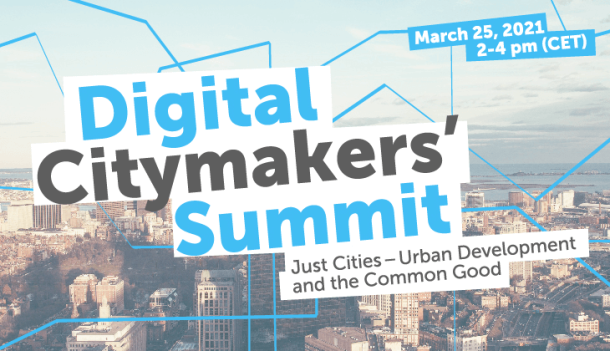
The 1st Digital Citymakers Summit sheds light on the principles of justice as a condition for sustainable urban development
Just, green and productive cities: these are the three principles established in the recently renewed Leipzig Charter to achieve urban development for the common good. Focusing on the principle of the just city, the Digital Citymakers Summit—the first online event on the USE platform—was held on 25 March. Organised by the city of Berlin, the event had more than 200 registered participants from across the globe.
Oliver Weigel, Head of the Urban Development Division at the German Federal Ministry of the Interior, Building and Community, outlined the five key principles for good urban governance set out by the new Leipzig Charter: urban policy for the common good, an integrated approach, participation and co-creation, multi-level governance, and a place-based approach.
The result of a two-year long drafting process and agreements between all the European ministries responsible for urban affairs, the Charter provides a key policy framework for sustainable urban development in Europe and serves as an inspiration for other world regions. The document highlights the need to establish integrated and sustainable urban development strategies and ensure their implementation at every level, from neighbourhoods to local authorities and wider functional areas, including at a metropolitan level.
The main body of this event took place across seven networking sessions hosted by Metropolis and USE partner organisations, and further explored the topic of justice and community-oriented urban development by presenting practical examples.
Lessons learnt from Covid-19
Nicholas You, Executive Director of the Guangzhou Institute for Urban Innovation, led a session that focused on the systemic weaknesses and flaws in how we plan, manage and govern our cities. The pandemic has made these shortcomings even more apparent in terms of inequality, not only in access to fundamental services, but also in how we design urban spaces. In You’s words, “We are getting to see how poorly-governed cities and regions are. What the pandemic has shown us is the inconsistent communication that exists between different jurisdictions and agencies.”
“If we are to rebuild better than before, we must, first and foremost, address fundamental inequity”, Nicholas You
The Guangzhou Institute for Urban Innovation, founded as an international network of experts and institutions dedicated to furthering urban innovation concepts, tools, and methodologies, is documenting best practices in response to the pandemic with a clear focus: “If we are to rebuild better than before, we must, first and foremost, address fundamental inequity.”
Gender mainstreaming
Today's major cities have not been established naturally. On the contrary, they have been historically constructed as a result of social conventions, models, and practices designed mainly by men, excluding women from the process of defining and designing cities. The use of urban space, according to the gender roles assigned to women and men, have established and normalised inequality, which leads us to ask: How can we build metropolises without inequality, exclusion, and segregation? Lia Brum, Metropolis Observatory Officer, conducted a networking session to highlight and discuss gender issues in the context of the world’s major metropolises, and shed light on the experiences published on the USE platform that promote gender equality in our cities and metropolitan areas.
Migration governance
Fátima Fernández, Focal Point for the MC2CM project and the Mayors Mechanism, which falls under the Global Forum for Migration and Development at the UCLG World Secretariat, explained how to build a bottom-up approach to a policy area strongly characterised by top-down strategies, where legal frameworks and agreements are set by national governments.
“It is crucial to strengthen a different vision of migration, a narrative based on a human rights perspective and a people-centred approach”, Fátima Fernández
Local and regional governments bear great responsibilities, which is why UCLG developed a programme with an approach based on city-to-city cooperation. The programme produces outputs on both a technical and policy level, allowing local governments to make the case for decentralised migration governance. “It is crucial to strengthen a different vision of migration, a narrative based on a human rights perspective and a people-centred approach”, Fernández said.
The summit also featured network sessions on citizen participation, social inclusion, housing and resilience by representatives from URBACT, Eurocities, World Habitat and UCLG.
During the event, Barbara Berninger, Head of the Division for International Relations at the Berlin Senate Chancellery and Metropolis Regional Secretary for Europe, took stock of the role Berlin has played in Metropolis and the expansion of the USE platform over the past few years: “Exchanging experiences and mutual learning are key aspects for metropolitan development, which is why Berlin has been one of the most active members of Metropolis for many years, likewise, Metropolis is one of the main pillars of Berlin’s international work.” USE is a result of this strong collaboration, and acts as an important knowledge platform for sustainable urban development.
For more in-depth coverage of the event, please visit the USE platform’s newsroom.

